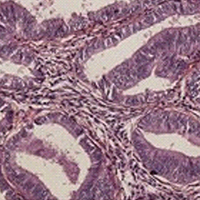 Smart Citations
Smart CitationsSee how this article has been cited at scite.ai
scite shows how a scientific paper has been cited by providing the context of the citation, a classification describing whether it supports, mentions, or contrasts the cited claim, and a label indicating in which section the citation was made.
PD-L1 expression with QR1 and E1L3N antibodies according to histological ovarian cancer subtype: A series of 232 cases
Therapeutic strategies for epithelial ovarian cancers are evolving with the advent of immunotherapy, such as PD-L1 inhibitors, with encouraging results. However, little data are available on PDL-1 expression in ovarian cancers. Thus, we set out to determine the PD-L1 expression according to histological subtype. We evaluated the expression of two PD-L1 clones – QR1 and E1L3N – with two scores, one based on the percentage of labeled tumor cells (tumor proportion score, TPS) and the other on labeled immune cells (combined proportion score, CPS) in a consecutive retrospective series of 232 ovarian cancers. PD-L1 expression was more frequent in high grade serous carcinoma (27.5% with E1L3N clone and 41.5% with QR1 clone), grade 3 endometrioid carcinoma (25% with E1L3N clone and 50% with QR1 clone), and clear-cell carcinomas (27.3% with E1L3N clone and 29.6% with QR1 clone) than other histological subtypes with CPS score. Using the CPS score, 17% of cases were labeled with E1L3N vs 28% with QR1. Using the TPS score, 14% of cases were positive to E1L3N vs 17% for QR1. For TPS and CPS, respectively, 77% and 78% of the QR1 cases were concordant with E1L3N for the thresholds of 1%. Overall and progression-free survival between PD-L1 positive and PD-L1 negative patients were not different across all histological types, and each subtype in particular for serous carcinomas expressing PD-L1. Expression of PD-L1 is relatively uncommon in epithelium ovarian tumors. When positive, usually <10% of tumor cells are labeled. QR1 clone and CPS appear the best tools to evaluate PD-L1 expression.
Ethics Approval
The study was approved by the Ethics Committee “Comité d’éthique de la recherche en Obstétrique et Gynécologie (CEROG)” (number CEROG 2019-GYN-1102 “phenotypic profiles identified in epithelial ovarian cancers”)How to Cite
PAGEPress has chosen to apply the Creative Commons Attribution NonCommercial 4.0 International License (CC BY-NC 4.0) to all manuscripts to be published.









